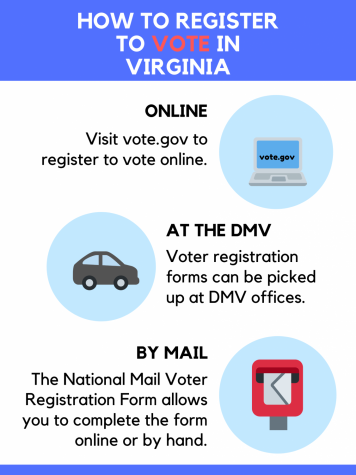To vote or not to vote
Chargers discuss the importance of taking political action
February 7, 2020
The current political atmosphere in America is incredibly polarized, but regardless of ideology, a fundamental value in American culture is participation in government and deriving governmental power from the people. It is vital to the structure of the American political system that citizens voice their opinions; one way to do so is to vote in local, state and presidential elections. In this year’s presidential election, if a resident of Virginia turns 18 before Nov. 3, they are eligible to vote in both the primary election on Tuesday, March 3 and the federal election on Nov. 3. For many young people, this prospect is met with excitement and a sense of responsibility.
“I am actually excited to vote and have an impact on what is going to happen in our government in the future for the first time,” senior Bryanna D’Souza-Bohannon said.
In some democratic systems around the world, countries require citizens to vote in elections. However, in the U.S. this is not the case. Many people choose not to vote for religious reasons or feel that not voting is a political statement within itself, but others believe that those who don’t vote are apathetic toward politics.
“I think not voting as a political statement is ridiculous because by not voting you are making your voice not heard,” senior Noemi Pimentel said. “People are lazy and they don’t want to go out and use their voice, which I think is sad.”
Whether a voter or nonvoter, every American citizen is entitled to his or her own opinion and political beliefs. Some believe politically active nonvoters cannot have an impact on legislation, creating a mismatch between public opinion and enacted legislation.
“I think that voting is a choice people should make when they are eligible,” D’Souza-Bohannon said. “A lot of people choose to complain or voice their opinions on how the government should work, yet don’t vote to push forward their ideas or spark a change to begin with, which I think is contradictory. It also creates a false representation of public opinion.”
Many believe that voting is an important aspect to any democratic system because it shows that power is rooted in the citizens of that country.
“By allowing people to vote for who they want, we can clearly see who the majority wants the leader to be and can then create an effect in government,” freshman Sidharth Tanjore said.
Politics is a subject that is deeply controversial and is often able to pit people against each other. Causing tensions at the dinner table and vilifying the opposing side prevents many from engaging in political conversation, potentially turning people off from politics in general. With such severe polarization across the country, it’s impossible for candidates to appeal to every single person, and many voters are unable to find politicians they fully support.
“I think a lot of people don’t vote because they don’t like any of their options,” D’Souza-Bohannon said. “They think it’s better to not support anything rather than support what they deem the lesser of the two evils.”
Voting is a common way in which people participate politically in their communities, and as long as one is 18 or older, a U.S. citizen and meets their state’s residency requirements, they are able to do so. Before voting, it is required that a person registers, which can be done online or in person at the local Department of Motor Vehicles (DMV). Outside of voting, there are many other ways to be politically active in a community. Examples include attending protests, reaching out to elected officials, participating in political discussions, volunteering for campaigns and supporting groups that push certain policies.
“Though I think it is important to vote, there are so many other ways that people can be active and fulfill their democratic duties,” D’Souza-Bohannon said. “I think that any way you partake in politics or motivate someone to be politically active is something that we should be grateful for and is something worth celebrating.”

Momiji Barlow

